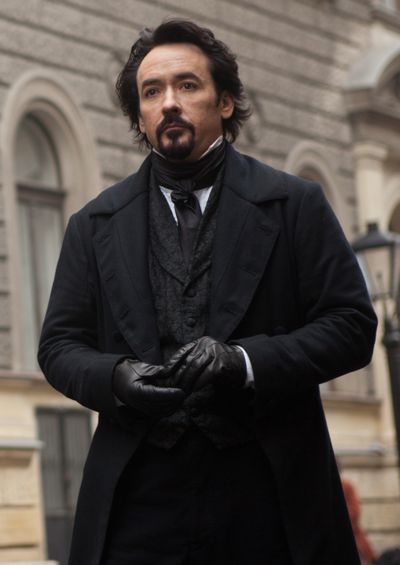Cusack defends his Poe-trayal
‘The Raven’ imagines poet’s final days

ORLANDO, Fla. — John Cusack has heard the sniping. He’s Internet savvy, a big-time Twitter user. So he knew Edgar Allan Poe fanatics were complaining about the movie he was making about the writer. He knows the early reviews of “The Raven,” in which he plays the poet/ thriller writer as a haunted man on the trail of a serial killer, haven’t been kind.
“Poe probably deserved better than this movie which turns his heritage into a sub ‘Se7en’-style serial killer thriller,” sniffed Britain’s Birmingham Post. But Cusack isn’t taking that lying down.
“Somebody I’ve read said, ‘Oh, he wasn’t some heroic man of action.’ And I go, ‘Oh really? He went to West Point. He was kicked out, but he was there. He got in. And he was a swimmer. It’s not a stretch to think of him trying to solve a mystery, a series of crimes. He had an analytical, mathematical mind. You can see that in the writing. He called it ‘rationation.’ But basically, he invented forensics in his fiction.”
And Cusack is just getting started. An actor fond of finding the dark side in light characters and bringing lightness to the dark ones, Cusack found Poe to be right up his alley. At 45, Cusack has lived his movie-making life by making more interesting choices than commercial ones. He’s just hoping filmgoers get into Poe the way he got into the author of “The Tell-Tale Heart,” “The Raven” and “The Cask of Amontillado” — the 19th century author who popularized the short story, invented the thriller, detective fiction and, some say, science fiction. “The Raven,” directed by James McTeigue (“V For Vendetta”), reimagines Poe’s last days and the mystery surrounding his death.
“I loved the conceit, here,” Cusack says. “Poe getting caught up in one of his stories, trapped by a fan who is mimicking the murders in his work.
“He wrote about gruesome crimes … And he wrote about people going mad, as in ‘The Tell-Tale Heart.’ ” The movie acknowledges Poe’s mental state, but makes note of his scathing wit and wicked wordplay.
“He was on the verge of madness, a lot of the time. He was a poet who wanted to understand death, walked around graveyards, wanted to scare the hell out of himself. What a crazy, wonderful character to play.”
The screenwriters for “The Raven” reference various Poe works and have the serial killer connect the murders by names, addresses and manners of death depicted in Poe’s fiction. They establish a “ticking clock” element to the pursuit by borrowing plot elements from Poe’s “The Premature Burial.” Cusack wanted “the REAL Poe” to be as present as possible, so he pushed for quotations from the stories and Poe’s own letters.
“ ‘I could distinctly hear the sound of darkness as it stole over the horizon,’ ” Cusack says, noting a favorite line. “He revered women and every one that he loved died in his arms, coughing up blood. “‘I could not love except where Death. Was mingling his with Beauty’s breath.’ “Poe transmuted all the tragedies of his life into his writing.”
And that, Cusack argues, is what “The Raven” does.
“The real Edgar Allan Poe was acerbic, needy, loved his wife and adored being adored. He was very aware of being famous.
“He was a paradox, a larger-than-life figure who was a whole lot of things at once. He certainly wasn’t just a melancholy, inward-looking and intense artist. He was a man, too. We wanted to show a lot of facets to the man.”
And some Poe fan film critics are buying into that, praising its “literate script, atmospheric direction, some suitably grisly murder sequences and a superb performance from John Cusack.” (ViewLondon).
Whatever others read into the film, Cusack says he “never saw it as some lame attempt at turning this guy into an action hero. Seriously, if you like Poe, if you know something about this frail, vain, but also courageous, pioneering writer, I think you’ll see we did justice to him.”